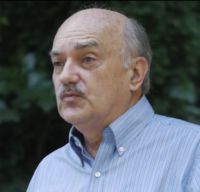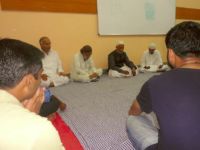We thirteen Jesuits (five from JCAP and eight from JCSA) gathered at Nav Jivan Renewal Center, Delhi, from 19 to 21 December 2014 to share our experiences and concerns for the Jesuit mission among Muslims in Asia [JAMIA]. Fr Heru Prakosa SJ, one of the members of the expert committee that helps Fr General on the Society’s relations with diverse religions convened the meeting. The gathering had the blessings of both presidents of the Jesuit assistancies/conferences. Fr George Pattery SJ (POSA) presided over the concluding Eucharist affirmed that this meeting is significant since the two Assistancies meet in collaborative ministry.
On the first day we spent time in sharing with one another our work among Muslims. It is encouraging to note our work touch upon every important dimension of dialogue: theological reflection on Christian Muslim relations, initiatives in political dimension of dialogue to restore peace and harmony, working with youth to inculcate in respect for diverse faith and inspire in them a commitment to protect diversity, and keen interest in spiritual dimension of dialogue with Muslims.
Six major challenges emerged in our discussion.
1. It has been found that often Muslims conflate Christians with the Western society. They do not adequately distinguish between the western society that is post-Christian in its texture and the Christian faith that is lived differently in different parts of the world. However, what cannot be denied are certain negative characteristics of western culture like individualism and capitalism overwhelm Asian Christians along with their co-believers. There is an urgent need to articulate and live out a Christian way of live that emphasizes harmony and common good.
2. Radicalism, fundamentalism, intolerance and culture of violence spin a web of anti-life culture around us. We Jesuits have not focused our attention sufficiently on these issues. Our Mission calls us to deepen our understanding of all these phenomena from social, cultural, political, and religious points of view and explore possibilities to restores justice filled reconciled and harmonious world. It is urgent to have a think tank that works on it.
3. While we notice a link between religious fundamentalisms of different hues with puritanism, a way of thinking that does not take into account the connection between faith and cultural context, we recognize that it is very important for the Jesuits of Asia to continue to explore and develop contextual theologies that put us in touch with diverse faiths and believers. We propose that we set up a possibility of having regular joint studies between Vidyajyoti College of Theology (Delhi, India), Sanata Dharma University (Indonesia) and Henry Martyn Institute (Hyderabad, India). In addition, we also need to set up a joint conference with Muslim scholars.
4. We recognized the necessity of intrafaith dialogue with our fellow Catholic Christians. It is important to narrow the gap between Christians who are already open to dialogue and some others who may still have to go beyond their hurts, biases and suspicions in their view of Islam and its followers. We believe that this intrafaith process will lead Christians to become more effective witnesses to the love of Christ among all peoples. The training program APTEP (Asia Pacific Theological Encounter Program) that is set up by Sanata Dharma University and the ‘Tayo-Tayo Muna Intrafaith Movement” in the Philippines are important steps towards the right direction.
5. We also recognize that we are not sufficiently connected with one another. It is important to bring together and learn from one another from all those who strive for conflict resolution, peace building, advocacy, education, training, social action, theological and spiritual studies. It will be fruitful to revive the “Asian Journey” that brings such people together.
6. During our discussion, we also detected a serious disconnect between the ‘faith and justice” focus as emphasised by GC 32 and the call for more sensitivity to ‘culture and interreligious dialogue’ as enshrined in GC 34 and 35. We commit ourselves to helping design modules to enrich our social analysis and pastoral praxis that integrates the wisdom from the recent documents, especially as in input to the forthcoming 36th General Congregation.
7. Some plans and programs have been proposed and accepted for the future, namely:
· Joint Studies and Conferences sometime in 2016
· APTEP in April 20 – May 20, 2015, in Jakarta-Yogyakarta, Indonesia
· “Asian Journey” in September 28 – October 1, 2015 in Bali, Indonesia



Leave A Comment
You must be logged in to post a comment.